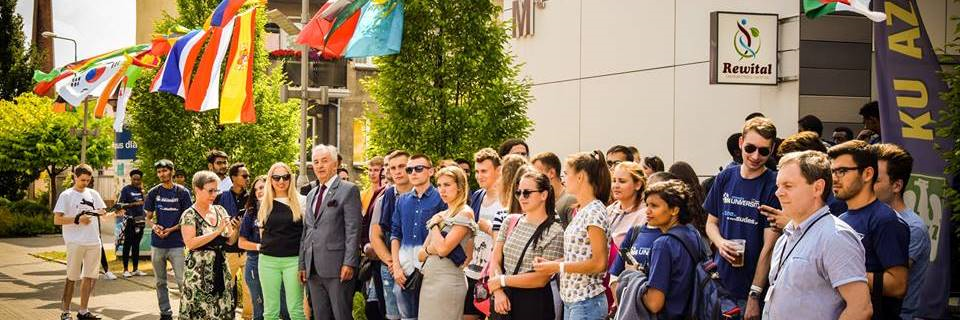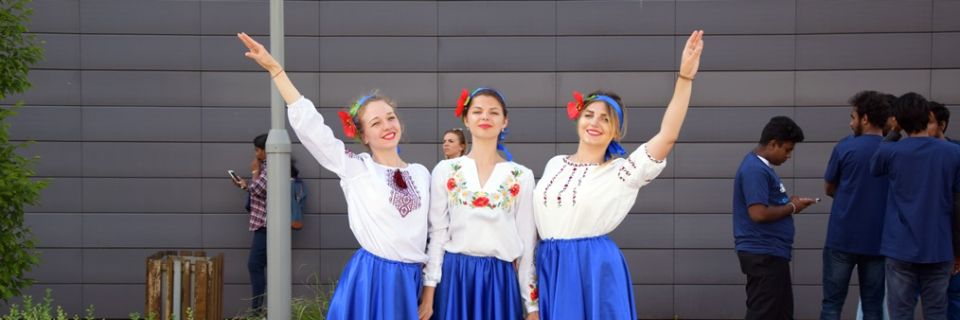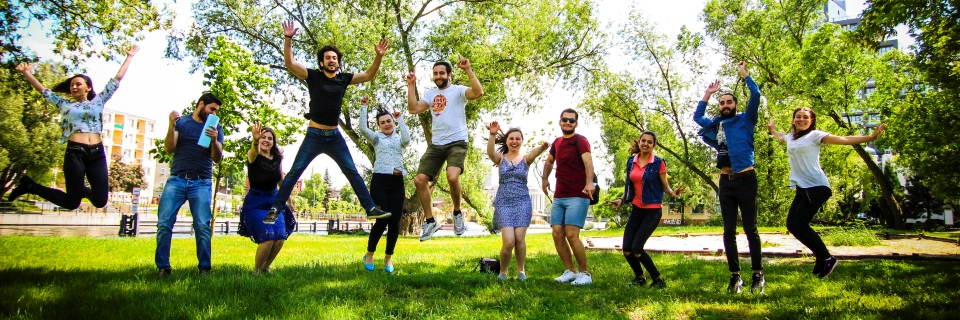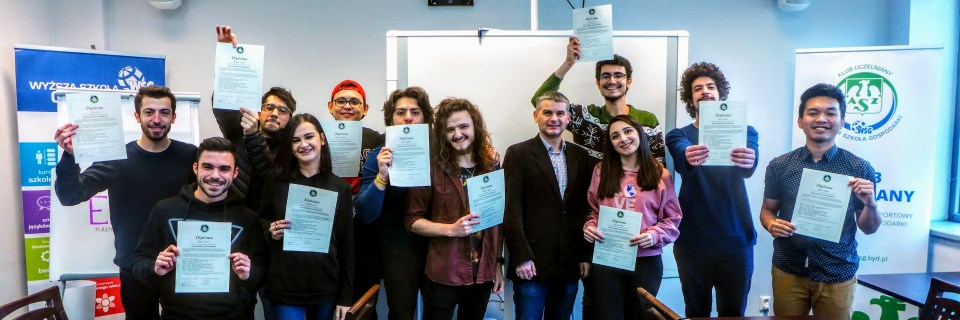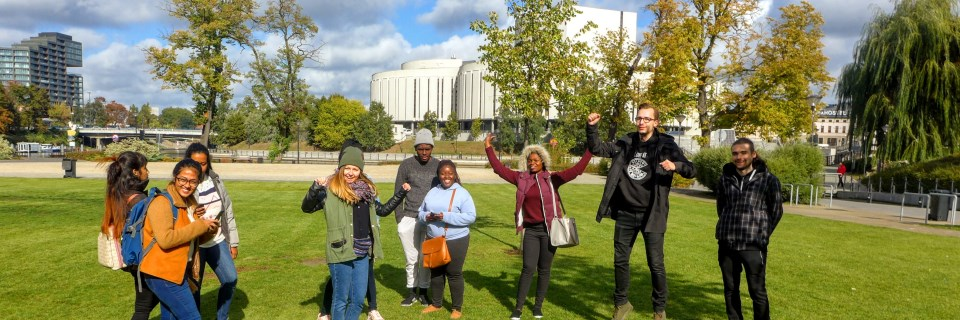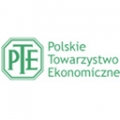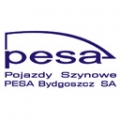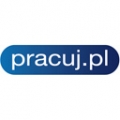Erasmus policy statement
1. What would you like to achieve by participating in the Erasmus Programme? How does your participation in the Erasmus Programme fit into your institutional internationalization and modernization strategy?
(Please reflect on the objectives of your participation. Please explain how you expect the participation in Erasmus to contribute towards modernizing your institution, as well as on the goal of building a European Education Area[1], and explain the policy objectives you intend to pursue).
Internationalization in the early 21st century is one of the key strategic challenges. The challenges of globalization and increased competition in the international education market will require increasing openness to various forms of international student and scientific exchange. The last decade has seen progressive globalization of higher education, which has become an integral part of all university activities around the world. For many years, foreign study tours have been consistently very popular among students and academics. We are observing an increasing range of scientific research and research projects carried out in international communities.
Meeting the challenges of internationalization requires the creation, and then continuous improvement, of unique educational programs in English and the development of new competitive marketing strategies.
Therefore, widely developed international contacts with institutions (not only educational ones) from all over the world under the Erasmus+ Programme are an indispensable part of the University's development and have a significant impact on improving the quality of its activities in all areas of its activity. International activities should be seen as a natural part of its activities. Internationalization of the University should thus not be an end in itself, but a tool to improve quality in all areas of the University's operation.
Currently, in addition to professional competences, international competencies and digital competencies are very important in the labor market. These include information and data literacy, communication and collaboration, media literacy, digital content creation (including programming), security (including digital comfort and competencies related to cybersecurity), intellectual property aspects, problem-solving and critical thinking. University graduates are required to have well-educated so-called "soft" competencies, needed in a borderless labor market. These include the knowledge of cultural differences or the ability to work in an international team.
Moreover, the mission of the University is to shape attitudes that respect other nations and cultures and perceive the world without xenophobic thinking. Including more and more international elements in the teaching offer will help the University to achieve this goal and to equip its graduates more effectively with knowledge and competencies in the abovementioned scope.
Considering the development plans and the potential of the University of Economy in Bydgoszcz, the following main objectives for the internationalization of the University within the Erasmus+ Programme are set:
1. Strengthening the University's brand as an international and recognizable institution on the world map of higher education.
2. Knowledge transfer and generation in cooperation with foreign partners.
3. Increasing the number of students and staff participating in the Erasmus+ Programme
4. Improving international and digital competencies of employees and students.
5. Improvement of the educational process and quality of education, including in particular curricula (formal, non-formal, and informal learning).
6. Creating new products for educational offers in cooperation with foreign partners.
7. Improving university functioning based on the processes of digitization, "Erasmus+ without papers".
A widely developed partnership network with universities and other institutions from abroad is one of the fundamental conditions for success in the process of internationalization of the University of Economy in Bydgoszcz, as most of its international activities must be carried out with the participation of foreign partners. The beneficiary will significantly increase its ability to cooperate at the international and European levels. Under the Programme, the Beneficiary will acquire many new foreign partners with whom cooperation agreements will be signed. Cooperation with foreign institutions under the Programme will give the Beneficiary an opportunity to become acquainted with other foreign institutions, learn about their profiles and strengths, as well as the specifics of this institution's functioning (its administrative and scientific-research units) as well as important didactic and research interests of its employees.
Through cooperation under the Programme, institutions very often decide later on to strengthen cooperation and implement joint undertakings also outside the Programme. In other cases, thanks to the support of the Programme, it will be possible to meet employees of institutions already cooperating with each other under joint undertakings. The occasion to meet will bring a new quality to the common contacts and facilitate cooperation.
The Beneficiary's participation in the Program will contribute to the improvement of language skills of university employees and students and will allow them to gain experience in working with culturally diverse students. By increasing these competencies in their research and teaching staff, the Beneficiary will be able to increase the number of subjects available for studying in English. By having study programs in a foreign language, the university will increase its ability to cooperate at an international level. A university with programs in a foreign language is much more effective in attracting foreign students not only within the Programme but also students coming for the entire educational cycle. With programs in a foreign language, the university has more opportunities to receive
employees of foreign universities wishing to conduct classes under the Programme or under the Visiting Professors program. Participation in the Program and promotional activities will also contribute to the increase of awareness and knowledge about the Program among university employees, who are thus themselves interested in travels and can answer students' questions about the Program. By participating in the Programme and implementing mobility, the university will become recognizable for many foreign institutions.
All the above-mentioned planned achievements are in accordance with the objectives defined by the Strategy for Internationalisation of the University of Economy in Bydgoszcz, the Erasmus+ Policy Statement, as well as the higher education modernization program. In compliance with the provisions of the Erasmus+ Policy Statement, from the beginning of its existence, the Beneficiary takes steps to implement high educational standards in order to achieve the objectives set out in the Bologna Declaration and in the European Qualifications Framework. The execution of the Programme is an element that significantly contributes to the achievement of high educational standards.
2. Please reflect on the Erasmus actions you would like to take part in and explain how they will be implemented in practice at your institution. Please explain how your institution’s participation in these actions will contribute to achieving the objectives of your institutional strategy.
Various types of activities under the Erasmus+ program, including Learning Mobility (KA1), implementation of joint international projects with partner organizations (KA2) are linked to the objectives set out in the Strategy for Internationalisation of the University of Economy in Bydgoszcz.
The University of Economics is planning to continue activities related to Educational Mobility: exchange of students, lecturers, academic staff with the Programme Countries (KA103) and Partner Countries (KA107), and implementation of joint international projects with partner organizations (KA2).
The Department of International Affairs is responsible for international cooperation, implementation of mobility, and coordination of projects. Each year, the Beneficiary plans to carry out recruitment: in February among students for study tours and internships, in September for employees for training trips, and conducting classes. The Recruitment Committee appointed by the Rector of the University is responsible for recruitment.
The Beneficiary also has two recruitments for incoming students: for the winter semester applications are accepted until 15th December, for the summer semester applications are accepted until 15th July. Applications for the arrival of lecturers from partner universities are accepted all year round.
The Beneficiary's participation in the Programme will contribute to the acquisition of new competencies consisting in working in a different structure of the university and in an international environment, involving the need to use a foreign language and to take into account diverse cultures, habits, but also academic or organizational and structural differences. During working meetings or events of an international nature, there will be an opportunity to exchange contacts, transfer knowledge, and exchange experiences. This experience will lead to a more open and dynamic approach to the management of academic structures. Knowledge transfer and exchange of experience will trigger closer and wider cooperation between universities and attempt to implement joint projects.
Cooperation with universities and institutions from abroad will enable students of the University of Economy in Bydgoszcz to realize mobility related to work experience using external means. Internships abroad give students - in addition to acquiring the standard competencies provided for in the internship program - the opportunity to improve their language skills (especially the so-called trade-related language), digital competencies as well as to learn about new cultures and gain experience working in an international environment.
Participation in the exchange and periodic studies at foreign universities is an opportunity for students to broaden their horizons, discover other methods of teaching and learning, establish contacts with students from other countries, improve their language skills, learn to cooperate in an international environment, and thus increase their chances on the international labor market. On the other hand, participation in the exchange of both research - teaching and administrative staff will enable them to establish international contacts, exchange experience, and learn about the specifics of functioning of research - teaching and administrative units at partner universities, which will indirectly benefit not only the employee themselves but also their home university. During their visits to partner universities, employees also have the opportunity to use the library resources of the partner universities or to discuss issues of interest to them with representatives of the scientific community who are specialists in particular fields.
Arrivals of students from partner universities will give regular students of our University the opportunity to get to know other cultures, force them to communicate in a foreign language, and thus contribute to increasing the level of foreign language skills among WSG students. Moreover, the arrival of students is inseparably connected with the need for the University to conduct classes in English. Teachers conducting classes for exchange students can thus gain new experience (conducting classes in a foreign language, working with culturally diverse students), which in the future will be necessary to conduct classes within the courses offered entirely in English. The increase in the number of classes conducted in English for foreign students staying at the WSG as part of the student exchange may thus constitute a basis for launching entire study programs in English and thus contribute to the increase in the number of regular foreign students at the University.
Arrivals of lecturers from partner universities are not only a good opportunity to exchange experiences between research and teaching staff, but also a free, short cycle of didactic classes conducted for students of the host university. Therefore, the University should continue to make every effort to increase the number of incoming students and lecturers as part of academic exchange programs.
The abovementioned activities will contribute to achieving the main objectives of the internationalization of the University of Economics.
3. What is the envisaged impact of your participation in the Erasmus+ Programme on your institution? Please reflect on targets, as well as qualitative and quantitative indicators in monitoring this impact (such as mobility targets for student/staff mobility, quality of the implementation, support for participants on mobility, increased involvement in cooperation projects (under the KA2 action), sustainability/long-term impact of projects etc.) You are encouraged to offer an indicative timeline for achieving the targets related to the Erasmus+ actions.
The University declares that it will implement its activities in accordance with the principles of the Erasmus Charter for Higher Education (ECHE). The following objectives and indicators are planned to be achieved:
- increase student mobility for studies to 17 people per year;
- increase student mobility for placements to 23 persons per year;
- increase staff mobility for training purposes and for teaching purposes to 35 persons per year;
- increasing the number of students arriving from partner universities to 45 per semester;
- increase the number of teachers and employees from partner universities to 35 per year;
- greater involvement in cooperation projects with partner countries up to 1-2 projects per year;
- support to participants based on digitization, digitization processes, "Erasmus+ without papers".
The indicative timetable for achieving the objectives related to the activities of the Erasmus+ Programme can be divided into several stages:
1. Introduction of activation measures to contribute to the fulfillment of indicators.
2. Support of participants before, during, and after mobility.
3. Project impact.
1. Activation measures which are to contribute to the fulfillment of the abovementioned indicators:
- the organization of an Orientation Week at the beginning of each semester for students arriving under the Programme;
- improvement of the Study Buddy Programme for students coming under the Programme;
- improving the offer of the "Student Card" discount card and updating the "Students Guidebook" diary;
- updating "Bydgoszcz Guidebook for Explorers" for foreign partners;
- organization of Erasmus+ Fairs for students of the beneficiary and Erasmus+ Days for staff once a year;
- the organization of International Staff and Training Week for all interested Programme partners;
- the organization of Erasmus+ Days for students of the Beneficiary and students of partner universities;
- organization of International Students Day for all students of the Beneficiary;
- promotion through websites, cultural events, and international workshops Erasmus+ mobile app, Erasmus Without Paper Network, European Student Card Initiative.
2. Support of participants.
Before the mobility, the Beneficiary undertakes to:
- prepare a bilateral agreement in consultation with the partner university through the Erasmus Without Paper Network;
- provide in the bilateral agreement all necessary contact details, including contact in visa matters, insurance, and accommodation;
- include in bilateral agreements links to the guide for incoming students and workers, including students and workers with disabilities;
- also include information on its own grading system and the conversion of obtained grades into ECTS grades;
- publish in advance an up-to-date catalog of classes available in English for incoming students in a given semester on its website;
- provide cultural and linguistic preparation of the participants, organize a "pre-departure" meeting;
- help with obtaining a visa and insurance;
- sign and return to the participant all necessary documents of the Learning Agreement, Mobility Agreement, Nomination Letter;
- present and help participants to install Erasmus+ mobile app, European Student Card Initiative, OLS mobile app;
- sign financial agreements with the participants;
- inform about the process of crediting a period of mobility.
During mobility.
Students and incoming staff are looked after by the Department of International Affairs in cooperation with Institute Coordinators and Directors of Institutes. The beneficiary will offer support to both incoming and outgoing participants of the Programme. The incoming students will be offered support in the form of a Polish language course every semester. The course covers 20 hours, and the student will receive 3 ECTS credits for the course. For incoming students, it will be organized by the staff of the International Affairs Department at the beginning of each semester. The Beneficiary will also organize for students Board and Card Games Day, Student Ball, What can you do?, coffee workshops, film screenings, International Student Day, workshops on student etiquette and customs, International Food Picnic, Integration Evening, Christmas Eve. In order to make it easier for students to get acquainted with Poland, Bydgoszcz, and the University, the "Student Card", extended to other offers, will be launched. A guide for English-speaking students "Foreign Student Guidebook" will be published. Employees of the Department of International Affairs, including the University's Program Coordinator, will be on duty for students, during which they will answer questions and provide assistance to both incoming and outgoing participants.
For the incoming staff, the Beneficiary will organize a trip around Bydgoszcz and Toruń, Polish food workshops, meetings with the academic community (employees, students), a tour of the University's campus, a meeting with the University Authorities, the Bydgoszcz Guidebook for Explorers will be made available.
The beneficiary will undertake a number of promotion and information activities encouraging potential participants to join the project: Intercultural evening for foreign students, Erasmus+ Fairs, Erasmus+ Days, intercultural workshops for Programme participants, Academic Meeting at the beginning of each academic year, International Staff Training Week.
At the end of the mobility, the Beneficiary is obliged to:
- issue for participants admitted the "after mobility” section, "certificate of stay", "Transcript of Records";
- hold an interview with the returning mobility participants;
- recognize all students' achievements during their studies abroad and student placements together with their ECTS credits, enter information in the Diploma Supplement;
- recognize the period of workers’ residence abroad for the purpose of teaching or participating in training activities based on mobility agreements;
- calculate a 35% discount on tuition fees for exchange students participating in the Programme.
3.Project impact.
The implementation of the Programme by the Beneficiary will have a positive impact both on the organization itself and persons inside the organization, as well as on entities outside the organization.
Impact of Programme implementation on Beneficiary's employees:
- broadening horizons,
- getting to know other teaching methods, establishing contacts with lecturers from other countries (peer learning),
- learning to work in an international environment,
- exchange of experience with employees from other countries,
- getting to know the specifics of the functioning of scientific-educational and administrative units in partner universities,
- acquisition of new experiences by employees staying on-site and those leaving,
- conducting classes in a foreign language, conducting classes for culturally diverse students.
Impact of Programme implementation on Beneficiary:
- getting to know the specifics of the functioning of scientific-educational and administrative units in partner universities,
- the increase in the number of classes conducted in English at the Beneficiary's, which will form the basis for launching the entire study program in English and thus contribute to the increase in the number of regular foreign students at the Beneficiary's,
- having a well-developed network of partner institutions from abroad,
- increasing the number of dual degrees awards by strengthening cooperation with foreign universities.
Impact of the program implementation on students and employees of the partner university:
- acquisition of new competencies consisting of working in a different structure of the university and in an international environment, involving the need to use a foreign language and to take into account diverse cultures and habits;
- to gain new or improving digital competencies;
- transfer of knowledge and exchange of experience while participating in classes, working meetings;
- increasing international and language competencies, which will contribute to increasing competitiveness in the labor market.
The implementation of the Programme will affect external entities and the local environment - the results of the Programme (e.g. about International Staff Training, Orientation Week) will be communicated, among others, through an article in the Express Bydgoski newspaper, TVP3 Bydgoszcz TV, and PiK radio station. The partners will also provide information on the results of the program on their websites and publications.
These activities will have a positive impact on people from outside the institution, in the form of an increased level of awareness among the inhabitants of the region, including students and potential students.
The project will have an impact not only at the local and regional level but also at the national, European, and international levels. During the lecturers' stay at the host universities, meetings will be organized concerning their home university and the represented country. The meetings will aim not only at promoting universities in the partner institutions but also countries, European values, and European cooperation.
The beneficiary will make the results of the projects available through presentations at academic meetings and colleges. Students' accounts and photos will be published for public use on websites in order to provide information to those willing to participate in the program. The Beneficiary will also organize Erasmus+ Fairs, Erasmus+ Days for the academic and local community to share good practices through presentations, meetings with students who have already participated in the project.






